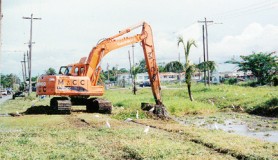The March 31 unveiling of the Georgetown municipality’s $3.5 billion budget presents City Hall with the first real test of the degree of its responsiveness to the recommendations made in last year’s damning report by a Commission of Enquiry into the operations of City Council.

Perhaps more significant than the more than doubling of the city’s budget over last year’s allocation was the open admission by the municipality’s Finance Committee Chairman, Deputy Mayor Robert Williams that in the light of revelations of mismanagement, incompetence and elements of fraud unveiled in the findings of the Commission of Enquiry, the preparation of the 2010 budget had proceeded under a significantly altered dispensation guided largely by Commission of Enquiry Chairman Keith Burrowes. In his budget speech Williams said the unveiling of the budget came following what he described as a “lengthy and meticulous participation from critical stakeholders.”
In an earlier interview with Stabroek Business, Burrowes, who serves substantively as Executive Director of the Health Sector Development Unit had said that in the light of some of the inefficiencies which the Commission of Enquiry had uncovered, procedures associated with budget preparation needed to be informed by higher levels of thoroughness and professionalism. Among the concerns over budget preparation which Burrowes had outlined to this newspaper were the need for the city’s departmental managers to rationalize their individual budgetary proposals, the importance of ensuring adequate financial allocations to the city’s core responsibilities and the importance of reconciling expenditure with spending.

Just how much Burrowes has been able to get his way in moving City Hall towards reform in the preparation of its budget was confirmed by the deputy mayor in his budget presentation. According to Williams, consistent with the approach recommended by Burrowes, City Hall finally arrived at a budget only after what he says were several “intense sessions” between Burrowes, who is also overseeing the implementation of the recommendations contained in the report, and managers within the municipality.
What was also apparent in the municipality’s 2010 budget was a deliberate effort to allocate the vast majority of its projected expenditure into its core responsibilities, one of the key pursuits of Burrowes’ strategy to turn around what he clearly believes has been a counterproductive ap-proach to budgeting by the municipality.
The single largest slice of the city’s 2010 budget – $408 million – has been allocated to drainage, the area of its responsibility which, arguably, has attracted the highest level of public criticism. The disclosure that there will be a significantly increased allocation for drainage in the city come just ahead of weekend downpours that appeared to mark the start of the rainy season, customarily attended by urban flooding resulting from clogged drains, canals and other outlets.
No less contentious has been the headaches which the council has faced in the discharge of its solid waste disposal responsibilities and this year the council has identified contracts with seven of ten waste collection areas within the city as accounting for a large slice of the $349.6 million allocation for solid waste management. Among the council’s other key solid waste challenges this year will be the closure of the controversial land fill site which the municipality shares with Le Repentir Cemetery and reining in the pollution and nuisance periodically created by the outbreak of fires at the Mandela Avenue landfill site.

Significant allocations have also been made for roads ($282 million) and public health ($235 million) two key areas of the council’s overall responsibility for the management of the city and areas in which it has continually attracted robust public criticism. Last week, this newspaper reported, not for the first time, complaints by the city’s Public Health Department that under-sourcing continued to impact significantly on its ability to enforce key public health regulations in the capital.
Arguably the most interesting allocation in the city’s 2010 budget is the $145 million allocated to revenue collection. Again, the hand of the Commission of Enquiry chairman appears to be behind efforts to strengthen its capacity to collect rates and taxes through the strengthening of several departments including the Management Information Systems (MIS) the Legal Department and the Debt Recovery Units all of which Williams said will be upgraded this year. The deputy mayor said during his budget presentation that the huge $470 million gap in funding the budget will have to be made up partially through non-financial support from government and from non-governmental organizations and with receipts from annual government subventions.
What is clear, however, is that City Hall is being challenged to improve its record of rates and taxes collection. Just days ago the municipality called for all premises being used as hotels, guest houses and bed and breakfast facilities to be registered, a development that will enable the council to demand and extract rates and taxes from those business houses.
Earlier this week Williams told a City Hall media briefing that the municipality will be moving to collect some $1.5 billion in taxes owed to the council by 143 properties since 1998. However, in the wake of the briefing a well-placed city official questioned “the believability” of Williams’ utterance, pointing out that such statements by senior City Hall officials had become “part of the customary PR of City Hall.” The official told Stabroek Business that there was “considerable doubt” that City Hall had “even the remotest idea” as to the number of delinquent properties or “the amounts that such properties might owe in taxes.”
